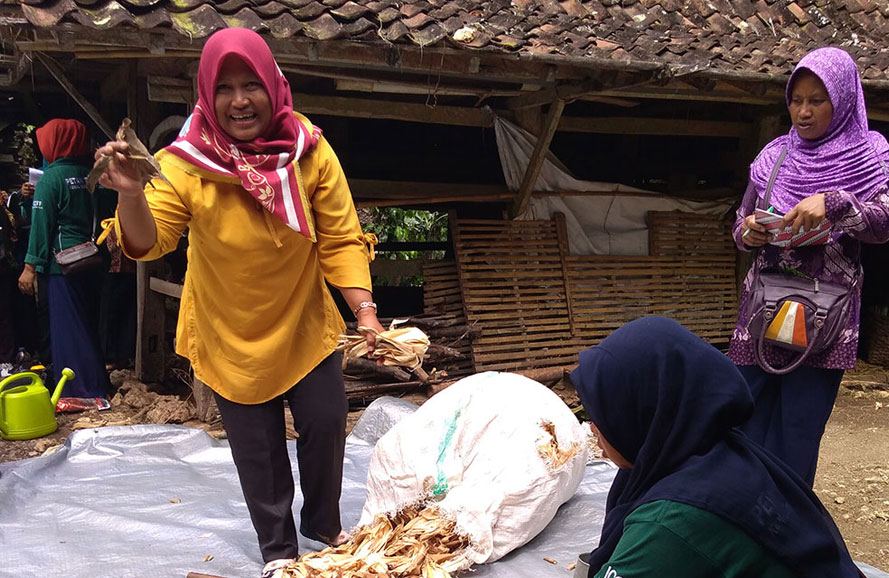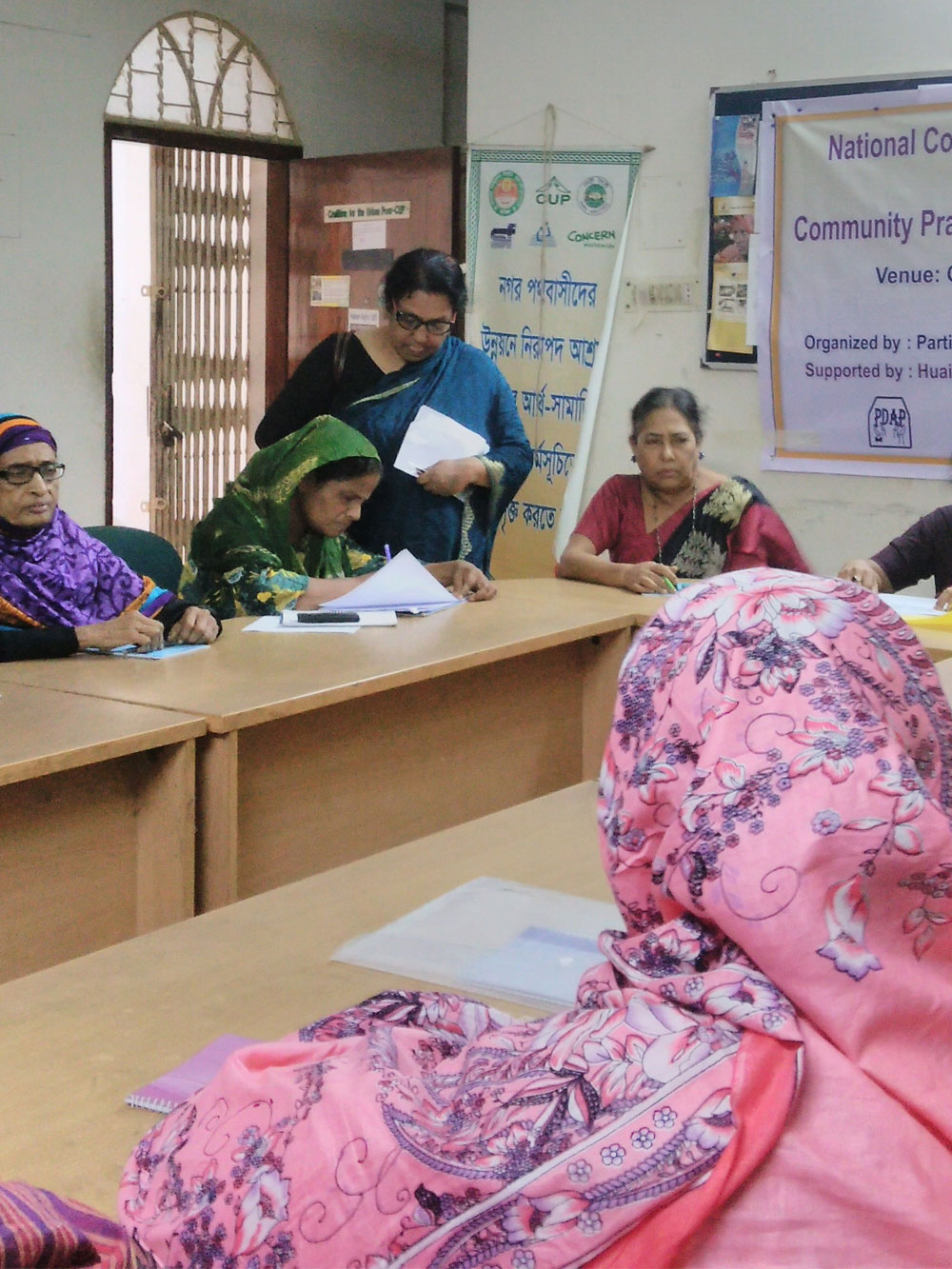The Community Practitioners Platform for Resilience (CPPR) is a multi-stakeholder platform that facilitates grassroots community groups faced with natural hazards, climate change, and deepening poverty and inequality to advance common strategies and develop policies and collaborative initiatives that promote pro-poor, resilient development.
Community Practitioners Platform for Resilience
Community Practitioners Platform for Resilience
Community-Led Resilience with Grassroots Women at the Centre
Risks associated with disasters and climate change have to be addressed if global aspirations to reduce poverty and inequality and secure development are to be achieved. Direct participation of people from low-income and disadvantaged communities is central to these efforts; yet it is widely recognized that support has not, for the most part, been successful in reaching poor people’s organizations. Indeed, most conventional approaches of community participation fail to build capacities or partnerships that can transform dominant models of development.
Women and men living in poverty have a track record of designing innovations and solutions that address development needs, reduce climate and disaster risk, demonstrate inclusion, and offer models for delivering impact at scale. These organized groups of “community practitioners” are working to strengthen community-specific processes of sustainable and resilient development. They are joining with others and providing leadership to collective action by their communities.

WHO ARE WE?
The CPPR was established in 2009 as a global mechanism for organized communities living and working in disaster-prone urban and rural areas to play an active role in implementing the Sendai Framework and driving disaster and climate resilience agendas at local, national and global level. Today, thanks to the advocacy work of HC, this grassroots networking and advocacy space is formally endorsed by the UN Office Strategy for Disaster Reduction (UN DRR) and serves as:

- A body of community practice and innovation
- A common platform for community practitioners to collectively develop advocacy agendas and engage policy makers
- A network of institutional collaborators prepared to champion community-led action
The CPPR includes:
- Community-based and grassroots organizations, especially those led by women, working on disaster and climate resilience who want to be part of a learning and advocacy network of peers.
- National government organizations, bilateral, and multilateral agencies with a strong commitment to engaging poor communities in government programs on DRR, climate change and poverty reduction.
- Civil society organizations or networks committed to facilitating the leadership of disaster-prone communities to learn and advocate for their resilience priorities.
Allies are invited to contribute to the CPPR through providing support to grassroots organizations and advocating for their priorities. They are invited as observers to the CPPR planning and may share views, experience and evidence that support the CPPR workplan.
CPPR Cored Advocacy Goals:
- Recognition of community practitioners or their platforms by the National Disaster Risk Reduction Platforms as a formal stakeholder group
- Inclusion of the CPPR priorities in the formulation of national and local strategies for disaster risk reduction and related policies and plans
- Targeting resources to local community networks and organizations to advance local implementation
- Resourcing CPPRs and assigning to them formal roles such as such as training, surveying, information dissemination, beneficiary identification and monitoring in disaster risk reduction, recovery and reconstruction
- Developing and operationalizing new dialogue mechanisms to enable CPPRs and government institutions to collaborate more effectively
Together, the CPPR has:
- Convened grassroots experts in regional and national forums to share practices, lessons and to identify advocacy priorities
- Promoted collaboration between community leaders and local authorities, national governments, donors and other policy makers
- Facilitated community-led actions that demonstrate the capacities of grassroots women and communities to undertake public leadership roles in resilience
- Developed products that communicate the accomplishments, insights and advocacy messages of the CPPR
CPPR AT THE GLOBAL LEVEL
Formal recognition from UN DRR has enabled community leaders to regularly present their accomplishments, challenges and policy priorities at high level panels and plenaries at global events such as the Global Platform for DRR, UNFCCC COP 23, Habitat III and the World Urban Forum. In addition, CPPR has regularly convened Grassroots Academies in conjunction with the Global Platform in order to facilitate grassroots-led practice sharing, prioritizing of advocacy agendas and dialogues with institutional partners. Members have used global policy venues such as the UNFCCC COP 23 , Habitat III and the World Urban Forum to call for directing financial resources to local communities for local implementation of the new global policy frameworks. In the process, CPPR has been engaging like-minded civil society organizations and networks in order to promote coherence across the 2030 Agenda, widen learning and amplify advocacy impacts of the CPPR.
In May 2017 in Cancun, during the first Global Platform for DRR following the adoption of the Sendai Framework for Disaster Risk Reduction – the CPPR convened a Grassroots Academy where participants showcased the work of 23 community practitioners from 11 countries, attracting a sizeable audience, including government representatives.
Vinod Menon, a former member of the National Disaster Management Authority of India concluded that “In Cancun, the Community Practitioner Platform was the largest single civil society stakeholder group fostering the leadership and networking of grassroots women and mixed local people’s organizations as a force for localizing the Sendai Framework for Disaster Risk Reduction and collaboratively solving problems with their governments. By example, they showed us how to succeed in realizing the commitment to inclusive, resilient development.”
Following on, a Grassroots Academy was convened by HC and CPPR at the 2019 Global Platform for DRR in Geneva. The two days of shared learning and strategic planning in Geneva showcased the impact of women-led community resilience practices and served to build a common agenda for collective advocacy. Participants specially valued the Grassroots Academy as a meaningful space for grassroots leaders to learn, exchange, build relationships among them, explore future collaborative opportunities, and strategize not only for the GPDRR but for the longer term.
GRASSROOTS WOMEN LEAD BUILDING LOCAL AND REGIONAL PARTNERSHIPS
CENTRAL AMERICA
- Central America has one of the most visible regional CPPRs. The platform includes grassroots women’s groups from Guatemala, Honduras, Nicaragua, and CEPREDENAC (Coordination Center for the Prevention of Disasters in Central America and the Dominican Republic). Regular CPPR meetings and special gatherings help renew and consolidate partnerships. For example:
- CEPREDENAC has appointed one woman from each country in Central America to the Regional Disaster Risk Reduction Platform and 150 women (30 in each of the 5 countries from the region) to be trained in GIS mapping by their respective national disaster management agencies. These women will then be certified as grassroots disaster risk reduction managers affiliated with their respective National Disaster Management Agencies.
- In Nicaragua, Las Brumas Cooperativa leveraged municipal budgets to support agriculture and marketing of produce at markets and fairs, strengthening women farmer’s access to markets.
- In Guatemala grassroots women members of Fundacion Guatemala participated in the National Dialogue Board on Disaster Risk Management and in the Forest, Bio Diversity and Climate Change Group coordinated by the Ministry of Environment whether they anchored creation of the gender commission.
AFRICA
- In Uganda, UCOBAC convened a Grassroots Academy with other CSOs that included representatives from the ministries of water, environment, climate change and the Kampala Capital City Authority. As a result of this Academy a sub-group of civil society participants agreed to work collectively to advocate for stronger government action to combat the effects of climate change.
- In Kenya, the Shibuye Community Health Workers signed a formal agreement with their Ministry of Agriculture to ensure that designated farm subsidies reach poor households in drought-affected regions.

ASIA
- In Nepal, Lumanti Support Group for Shelter held 3 national workshops on community post-disaster recovery efforts, where leaders of women’s cooperatives and NGO staff were joined by representatives of the Nepal Reconstruction Authority and the Kathmandu Metropolitan City.
- In India, Swayam Shikshan Prayog organized workshops and grassroots learning exchanges on reducing disaster risk among organizations in Maharashtra, Bihar, Odisha, Tamil Nadu and Assam. A strong partnership with the Bihar State Disaster Management Authority has led to a joint planning exercise on how to best deploy grassroots women’s skills and knowledge to strengthen disaster preparedness and response.
- In Vietnam, LIFE Centre has built an informal multi-stakeholder dialogue forum, convening collaborative dialogues between grassroots women, women’s unions, local government and multiple district agencies in Co Do District and Can Tho City to link women-led resilience solutions into mainstream local development programs.
- In Indonesia, YAKKUM Emergency Unit reports that CPPRs in two provinces have held consultations to identify risk-informed strategies for the local implementation of the SDGs and conveyed these to the National SDG secretariat.
